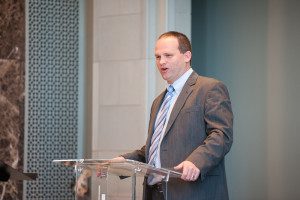 Stephen Owens spoke at a Belmont Chapel on Friday, Feb. 6, telling about his journey from resentment to forgiveness as his mother sat on death row for playing a major role in the murder of his father.
Stephen Owens spoke at a Belmont Chapel on Friday, Feb. 6, telling about his journey from resentment to forgiveness as his mother sat on death row for playing a major role in the murder of his father.
When Owens returned from church one morning as a 12-year-old boy, he found his father lying in the kitchen floor. Soon after, he testified against his mother, left the court room to live with his aunt and would not see his mother again for more than 20 years.
During this time, Owens went on to graduate college, get married, become a teacher and live a resentful life toward his mother. A series of life events followed that led Owens to understand God’s plan for his relationship with the woman he had grown to hate.
When Owens and his wife made the move from Memphis to Nashville, he could not find a job. After working an odd-job, he accepted a position teaching in prison, which Owens said was the first thing that began to change his heart. Later, he accepted a job teaching in Gallatin, and the headmaster referred him to a position at Christ Presbyterian Academy. Once there, a co-worker recognized his name and said that Owens’s mother had been a part of his prison Bible ministry for 15 years. It was then that Owens recognized the path God had led him down, and he began to seek God’s plan for forgiveness.
“In my darkest days, God was the only place I knew to turn. I would like to tell you the journey was easy, but a lot of my conversations with Jesus were not very nice,” said Owens. He had been teaching forgiveness to his children in his home, but he realized that if his son ever asked if he had forgiven his mother, he would have to say no.
In August of 2009, Owens mustered up the strength to visit his mother in prison to tell her he had forgiven her. After this difficult talk and a phone call alerting Owens to his mother’s scheduled execution date, he began getting involved in attempting to save her life. In a letter to then Governor Phil Bredesen, Owens asked for this not to be his “family’s legacy,” and to his surprise, Bredeson granted his mother’s freedom.
Owens said that people hesitate to forgive others for four main reasons including lack of desire, fear, partial forgiveness and their reliance on emotions. His advice to anyone dealing with the issues of forgiveness is this: to pray.
“To forgive is to set a prisoner free. And that prisoner is you,” said Owens. “Forgiveness is not an act of will. It is a function of divine grace. It took me 20 something years to get there, but oh, it was worth it.”
To watch Owens’s story, click here. To learn more about his book, Set Free, click here.
Owen’s talk on forgiveness was an opening event to the Tennesseans for Alternatives to the Death Penalty Student Conference held on campus Feb. 7. To read the Tennessean’s write up on the conference, click here.


